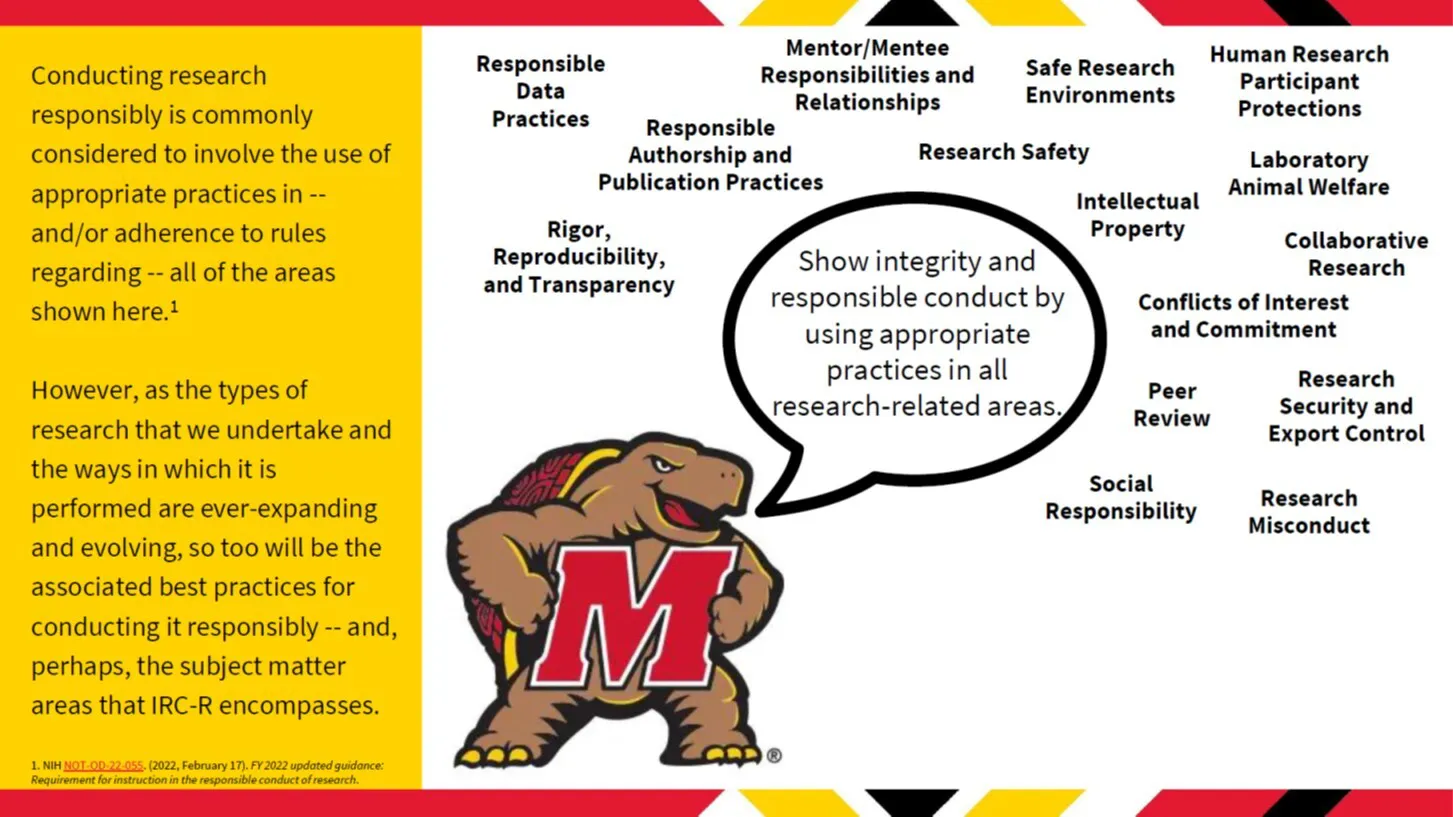Integrity and Responsible Conduct in Research
IRC-R

The integrity of our research is the foundation of the University of Maryland, College Park's reputation as a premier research institution. It is in this spirit that all research performed at the institution is expected to meet the highest standards for integrity in all areas of the research endeavor (e.g., authorship and publication; data acquisition, management, sharing, use, and reporting; disclosure of and transparency regarding conflicts of interest and conflicts of commitment; mentorship; the use of human participants and animals; export compliance; research security; rigor and reproducibility; and safe and inclusive research environments). To that end, we are dedicated to providing our faculty, students, trainees, and staff with the education and resources necessary to foster a culture of integrity in every aspect of their work.
University of Maryland, College Park Statement on Research Integrity
OIRC administers the institution's Integrity and Responsible Conduct program (“IRC@UMD”). IRC@UMD provides UMD faculty, staff, and students with education, training, resources, and support related to integrity and responsible conduct in research and professional activities. IRC@UMD programming includes courses on a variety of topics that are relevant to the UMD research community.
Why IRC-R?
We use the term “integrity and responsible conduct in research” (“IRC-R”) to refer to this programming, rather than “responsible (and ethical) conduct of research” (“RCR/RECR”), as a constant reminder of the inherent link between integrity and responsible conduct, and the practice of conducting rigorous, reproducible, trustworthy research.
UMD strives to continuously foster an environment that promotes integrity and responsible conduct in research. In such an environment, we expect that research is designed, conducted, and reported, with the highest of integrity and that it is sound, reliable, and trustworthy. Training and education in IRC-R plays a crucial and continuing role in achieving these goals and meeting these expectations.

IRC-R: The Basics
Integrity and responsible conduct (“IRC”) in research (“IRC-R”) refers to the practice of conducting research responsibly and with integrity. IRC-R involves the awareness and application of established regulations, professional norms, and ethical principles for all activities related to research.*
Establishing, reinforcing, and/or expanding researchers’ skills related to IRC-R is:
integral to professional development,
critical to fostering research integrity, and
central to ensuring the integrity, reliability, quality, and trustworthiness of UMD research.
(* The concept of IRC-R, as described here, is consistent with the NIH's 2010 definition of responsible conduct of research.1 For more on UMD's use of IRC-R, rather than "RCR" or "RECR" see the "Why IRC-R?" section of this page.)
IRC-R: Integrity and Research Activities

IRC-R: Practice and Scope

References:
1. National Institutes of Health. (2010). NOT-OD-10-019: Update on the Requirement for Instruction in the Responsible Conduct of Research. (https://grants.nih.gov/grants/guide/notice-files/not-od-10-019.html)

IRC-R: Programming
IRC@UMD's IRC-R programming is tailored to UMD’s research community so that all faculty, students, trainees, and staff are equipped with the education and resources necessary to demonstrate responsible conduct and foster a culture of integrity in every aspect of their work.
The IRC-R programming available through IRC@UMD is designed to:
- broadly foster a culture of research integrity by aiding our research community in understanding the expectations for conducting all aspects of their research responsibly;
- provide a foundation for acting in accordance with those expectations by offering guidance, best practices, and tools;
- help researchers generate and disseminate research and knowledge with integrity and rigor;
- ensure appropriate stewardship of funds that support the important work conducted under the auspices of the institution;
provide UMD’s research community with robust and comprehensive online training options that include institution-specific information and related resources;
directly address agency-specific regulatory requirements for institutions (such as NSF’s focus on mentorship training and other expectations related to research environments); and
- help our researchers fulfill related training requirements (including those set forth by funding agencies that support our work).
OIRC is committed to providing our community with the most relevant and up-to-date learning experience possible. In addition to offering new courses and instructional materials to meet the needs of UMD’s research community, existing online courses are updated periodically to reflect the latest regulations and related requirements, guidance, best practices, and resources.
Online IRC-R Courses
IRC@UMD has developed online IRC-R courses for the campus community. All IRC@UMD IRC-R courses are hosted on ELMS-Canvas and available through the Open Learning “Integrity and Responsible Conduct” catalog. Learners must enroll through UMD’s Open Learning platform to receive a certificate for completing these courses.
A list of currently available IRC-R courses with direct enrollment links is included below. These courses include:
IRC-R: Overview – This course is IRC@UMD's Integrity and Responsible Conduct in Research: An Overview of Related Topics, Best Practices, and Relevant Resources course. The topics covered in this course include: Rigor, Reproducibility, and Transparency; Mentor/Mentee Responsibilities and Relationships; Responsible Data Practices; Responsible Authorship and Publication Practices; Intellectual Property; Collaborative Research; Conflicts of Interest and Commitment; Research Security and Export Control; Human Research Participant Protections; Laboratory Animal Welfare; Research Safety; Safe Research Environments; Peer Review; Research Misconduct; and Social Responsibility.
For more information on this course visit the Integrity and Responsible Conduct Catalog in Open Learning or click on the direct link below.
IRC-R: Mentorship – This course is IRC@UMD's Integrity and Responsible Conduct in Research: Mentor/Mentee Responsibilities and Relationships course. For more information on this course visit the Integrity and Responsible Conduct Catalog in Open Learning or click on the direct link below.
IRC-R: Authorship – This course is IRC@UMD's Integrity and Responsible Conduct in Research: Responsible Authorship and Publication Practices course. For more information on this course visit the Integrity and Responsible Conduct Catalog in Open Learning or click on the direct link below.
Please reference our detailed instructions guide to help you through the process of enrolling in an IRC@UMD course. The guide also contains information on how to earn and access your course completion certificate.
Any individual who is required to complete this training should maintain a copy of their certificate/completion documentation so that they are able to provide it upon request.
Additional Learning Opportunities
There are additional IRC-R learning opportunities available at UMD and externally. These opportunities include:
- undergraduate and graduate-level courses on scientific integrity, RCR, and research ethics;
- workshops offered by the Office of Postdoctoral Affairs;
- department-level meetings, seminars, and workshops; and
- funding agency offerings designed to cover RCR topics, best practices, available resources, and other helpful information.
Individuals who offer or participate in such opportunities are encouraged to contact the Office of Integrity and Responsible Conduct (“OIRC”) via e-mail at ircp@umd.edu to discuss whether a particular event or course might satisfy the training requirements set forth in UMD's NSF Training Plan and/or other funding agencies/sponsors.

IRC-R: Requirements
Various funding agencies and sponsors of research have specific training requirements related to fostering and ensuring integrity and responsible conduct in research, and it is important for the different populations among our campus community to be familiar with the requirements that apply to them.
The most common requirements are associated with the National Institutes of Health (NIH), National Science Foundation (NSF), and the U.S. Department of Agriculture (USDA) National Institute of Food and Agriculture (NIFA). However, it is important to confirm whether any sponsors of your research have such requirements.
Click on the agency name below for additional information regarding its specific training requirements.
NIH
NIH requires responsible conduct of research training for "all trainees, fellows, participants, and scholars receiving support through any NIH training, career development award (individual or institutional), research education grant, or dissertation research grant." The agency provides detailed guidance regarding the recommended "instructional components" for such training, including its format, frequency and timing, and subject matter.
NSF
NSF requires training in the responsible and ethical conduct of research for all undergraduate students, graduate students, postdoctoral researchers, faculty, and other senior/key personnel participating in research supported by NSF funds. This training must address: mentor training and mentorship; training to raise awareness of potential research security threats, and Federal export control, disclosure, and reporting requirements.
For more information on the NSF requirements, visit the link below.
For more information on how to fulfill the NSF RECR Training Requirements at UMD, visit our "How to Fulfill NSF RECR Training Requirements at UMD" webpage at the link below.
USDA/NIFA
USDA/NIFA requires that program directors, faculty, undergraduate students, graduate students, postdoctoral researchers, and any staff participating in a research project funded by the USDA/NIFA receive appropriate training and oversight in the responsible and ethical conduct of research that must at a minimum emphasize "authorship and plagiarism, data and research integration and reporting misconduct."

